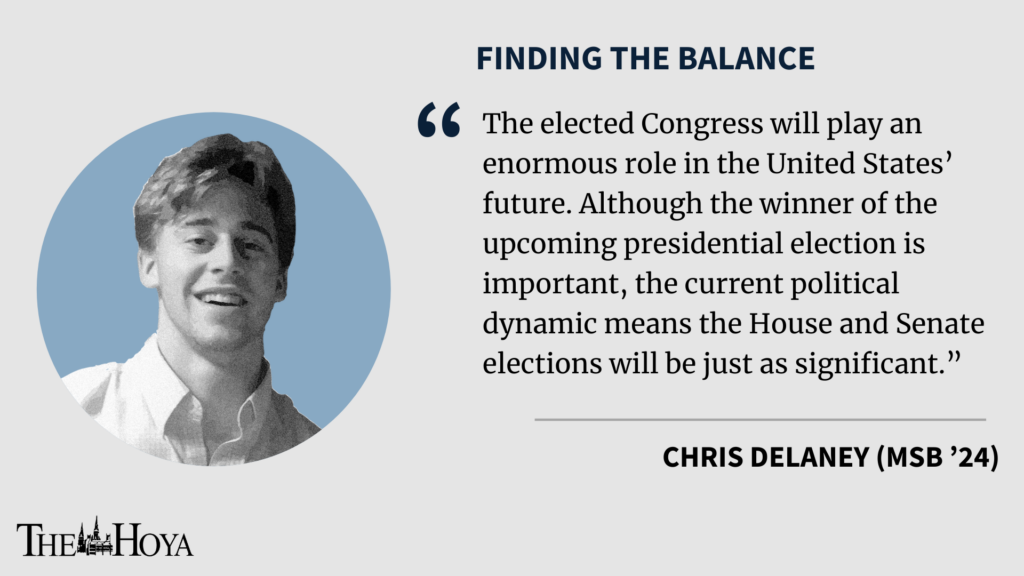If you are active in the digital world at all, you have probably seen a commercial, social media post or advertisement describing the importance of voting in the upcoming election. Get Out the Vote campaigns have reason to worry, however. In many states, the electoral votes are decidedly skewed, which often leads to low voter turnout because voters do not believe their opinion will matter in the end.
No matter the result of the presidential election, every eligible voter needs to vote for their members of the House of Representatives and the Senate, as the next president will face legislative barricades if Congress’ majority party does not match the party in the White House. This year, with a large presidential role and partisan divide, voting for congressional seats will be more important than ever before. Even if a state is decidedly red or blue, voting for federal representatives will best allow American voices to decide the direction of our country.
Before exploring the current executive role, a little context on presidential power can help explain how the country grew to be this way. As the first president, George Washington remained within constitutional boundaries and acted only as the head of military, a diplomat and a final veto for legislation. Thus, he set the precedent that presidents should have minimal centralized authority and legislative power. The role of the presidency has since evolved, however, through actions like President Andrew Jackson’s partisan cabinet appointments and President Franklin Delano Roosevelt’s thousands of executive orders, notably helping form the New Deal. The number of executive orders issued by presidents is one way to quantify power: Washington issued an average of one executive order per year, whereas President Barack Obama averaged 35 per year and President Donald Trump averaged 50 per year.
Political scientists Clinton Rossiter and Richard Neustadt argue that the expanded role of the modern president impedes the executive’s ability to influence their colleagues in the legislative branch, which is where their true policymaking power lies. The president has the special ability to convince legislators their opinion is best for the country. Yet this process takes time and effort, of which the modern president has little. Presidents today face countless pressures for foreign and domestic aid, which reduce the amount of time they can spend influencing legislative action.
In this upcoming election, the president’s responsibilities will be greater than ever, as their fellow partisans, governments abroad and U.S. citizens at large will demand aid and action on many pressing issues. Trump’s website boasts over 200 points of action he addressed during his term. Similarly, Democratic presidential nominee former VIce President Joe Biden’s vision addresses 48 different plans for the future of the United States.
These extensive agendas reflect the pressures from outside the White House — now, the president feels the need to do something about everything. Neustadt further argues that the president is not guaranteed influence over Congress by responding to these pressures. Thus, the extensive responsibilities of the president do not help their power, but ironically make cooperation more difficult.
This deficiency is worsened by today’s polarized political environment, in which cross-party collaboration in drafting and passing legislation requires a large amount of time and effort. The extensive role of the modern president as a clerk — a leader with many obligations outside of legislation — has given more power to Congress in shaping the United States’ legislative decisions. The president’s limited time causes their influence to only be prominent when they have party support in Congress. Thus, according to Neustadt and Rossiter, only a united government would allow the president to exercise their influence to its full extent.
The effect of Congress on Trump’s success has been evident, to say the least. In his first two years, the Republican-controlled Congress passed 442 pieces of legislation, compared to 169 in the current Congress, in which the House is controlled by Democrats. This phenomenon was also evident in 2012, when Obama failed to pass gun control legislation after the Sandy Hook Elementary School shooting because of opposition from a Republican House delegation. History shows that a divide between Congress and the presidency poses a significant obstacle to the president’s influence and power.
Considering the upcoming election, I believe the power of the president will depend on the party identity of the legislature. If elected with a congressional majority of the same party, the president will be able to influence the legislature at will, implementing their power to its full extent. If Congress opposes the president, however, their influence will likely be reduced to public appearances and executive orders — a fraction of the power available in an ideal situation.
The elected Congress will play an enormous role in the United States’ future. Although the winner of the upcoming presidential election is important, the current political dynamic means the House and Senate elections will be just as significant.
U.S. citizens must vote all the way down the ballot, as high voting percentages will allow for a Congress that represents the sentiments of the nation. Even if a state is dominated by one party, voting for representatives and senators allows smaller voices to be heard in Congress, which will have a significant role in shaping the direction of the United States for at least the next two years.
Chris Delaney is a freshman in the McDonough School of Business. Finding the Balance appears online every other Tuesday.









